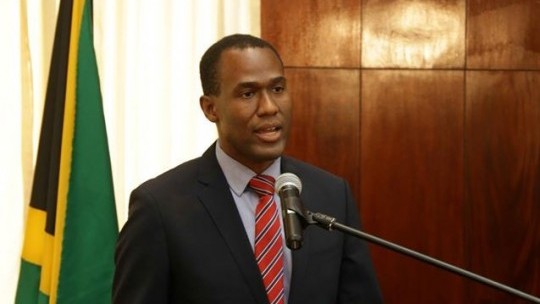
The recently formed National Transporters Alliance Group Limited (NTAG) has outlined a very ambitious plan titled – A National Public Transportation Plan For The Jamaican People 2022-2030.
Interim President and CEO of the newly formed National Transporters Alliance Group Ludlow Mclean, is hailing the formation of this cooperative style representation body as game changing for the Public Transportation sector.
The organisation he said was formed to better represent the interest and welfare of Route and Hackney taxi operators islandwide offering rides and last mile delivery services, and courier bikers, all operating through App based technologies.
The plan outlines in some detail what NTAG describes as a new business model based on a number of strategic and fundamental changes and implementation of a technology platform.
The purpose of the NTAG plan is to present a pathway and course of deliberate actions that will improve efficiency, transparency, and fairness, while providing the framework to accelerate the economic growth and development within the public Transportation sector by 2030.
“Our Mission at NTAG is To Achieve Vision 2030 Outcome #9 Of A Modernized Public Transport System That Contributes To Improved Quality Of Life For All Jamaicans.”
In this Six (6) part feature, Businessuite takes an in depth look at the plan for wider public consumption and discussion.

Part 1: Fish or Fowl – When It Comes To Fare Fixing, Are We In The Public Or Private Sector?
“Governments do not expect to make profits from the necessary support for public transportation. An efficient service is important for productivity and other economic benefits that come with moving goods and people. There needs to be a more disciplined approach of how buses are run in urban areas and then those who are served will follow suit. Public transporting should be subsidized. The economic benefits of subsiding will not be direct. The more efficient the public transportation becomes is the more efficient workers become; they reach work on time. They do not have to spend two hours or maybe 30 minutes in traffic” Dr. Lawrence Nicholson The University Of The West Indies
Are We In The Public Or Private Sector? This is a key and fundamental question the plan first seeks to establish, indicating that it must be addressed and clarified without doubt, especially in the matter of fixed and controlled fares.
Government imposed fixed and controlled fares is seen as the most pressing factor impacting investors and operators in the sector, as it directly impacts revenue, profitability and increased investments in the sector.
NTAG poses the following questions.
“Are we operating as private sector entrepreneurs, like the supermarket, gas station,
market vendors, farmers, manufacturers, banks, insurance etc., putting up our own
capital, and paying taxes etc., with the expressed goal to make a decent profit and ROI….If we make a loss that is for our own account.
OR
Are we in the Government operated and controlled Public Transportation Sector offering a public service, supported, subsidised and funded in part by tax payers money, so the Government fixed and controlled fares to the public is lower, as in the case of the JUTC.”
This question is raised against the background of Government policy, as articulated by Finance Minister Nigel Clarke in his 2022 budget presentation where he stated with much fanfare and chest beating that his Government does not believe in price fixing, a very important point to note.

“There is lot of history of failure with the policy of price fixing. History has taught us that when you fix prices, quantity inevitably declines and quality frequently suffers.” Hon. Nigel Clarke Minister of Finance and the Public Service
According to Hon. Nigel Clarke Minister of Finance and the Public Service in his budget presentation on Tuesday, March 8, 2022…. “We do not believe that telling banks what they must charge for a package of services solves this (fee) problem. We hold this view, as we know it would make matters much worse. We don’t believe in telling the market vendor what she should charge for mangoes or the sky juice vendor what he should charge for a bag juice.
There is lot of history of failure with the policy of price fixing. History has taught us that when you fix prices, quantity inevitably declines and quality frequently suffers. The reason is simple: if it is unprofitable to provide the services at the fixed price, the provider will simply choose not to provide the service and then we have a real problem. You can’t compel anyone to operate at a loss.
Also, whenever you try to fix prices instead of dealing with the fundamental underlying malady, the entity whose prices have been fixed will simply pass the costs unto consumers in other, potentially more damaging, ways.
We don’t believe in telling people what to do and in fixing prices. We don’t fix sky
juice price, we don’t fix bulla price, and we are not fixing no price. We do, however, believe in protecting the poor and vulnerable.”
According to NTAG this pointed comment by the Minister clearly makes their case and argument for allowing market forces and not the Government to set prices.
“When I hear people talk about a 15 per cent increase it is relative. That is on a $100 fare. It is not like a private sector employee who would see it as a very good increase because they are getting that on hundreds of thousands of dollars. We are business operators, self-employed individuals. We have been given basket to carry water over the years. We have not got a fare increase in over eight years, and every single thing we consume, to include taking care of our families, we are affected by that as well. Other sectors don’t have to apply to the Government for an increase. We have to apply and wait on them, so it is hard on the sector. We are told to get younger vehicles and when we do we can’t maintain the fleet.”
Sophia Campbell Head Route Taxi Association of Jamaica
NTAG’s position is that we are a private sector group of individual, corporate investors and operators, our firm position is that we are operating as private sector entrepreneurs, like the supermarket, gas station, market vendors, farmers, manufacturers, banks, insurance companies etc., putting up our own capital, and paying taxes etc., with the expressed goal to make a decent profit and ROI….If we make a loss that is for our own account.
NTAG does not support the view that the Government should set prices in the sector and that the forces of the free market should prevail, as outlined in the Governments position firmly articulated by the Minister of Finance in his 2022 Budget presentation.
“The truth is that each operator is licensed as an individual not as a corporation, but the same operator may operate multiple vehicles and each with its own specific road license to a specific vehicle and route. The individual is only required to come through an Association to deal with the Transport Authority, actually creating a cash cow for operators of these Associations. So, the answer to your question is yes an operator should be able to set his own fare structure. The problem it would cause is major disruptions and lots of variances in prices on any given route. Free trade is allowed in Jamaica. Price structuring no longer exist in Jamaica. Gas stations have the right to set his own prices. In fact, some corporate area gas stations have multiple prices in a day to capitalize on the rush hour crowd. What would be needed to make it work, is that every operator on a given route should discuss and agree on the price per route. They could also capitalize on raising the fare each time the gas goes up and decrease each time the gas price decreases”
Marcel Antonio Clarke Transport Sector Investor
Like Hon. Nigel Clarke, Minister of Finance and the Public Service, NTAG believes that the Government has better and more cost-effective ways and means of protecting members of the Jamaican public it deems warrants assistance and support in their public transportation needs. This in much the same way it subsidies the JUTC or provides PATH and other related social services, targeted at those who really need it.
“The operators are complaining about high fuel prices. they have to overcharge passengers in order to survive in a competitive industry.”
Ann Pearl President of the North East Manchester Taxi Association
In his budget presentation on Tuesday, March 8, 2022 Hon. Nigel Clarke, Minister of Finance and the Public Service said.. “We do, however, believe in protecting the poor and vulnerable. We do, however, believe in making more information available and allowing individuals to make their own choices. We do, however, believe that such a system is ultimately superior to one where you are told what to do.
There was a time we used to fix who could bring in food into Jamaica. You know what happened? The business people just set up shop in Miami and became the suppliers of the basic foods to Jamaica. Instead of making their money here in Jamaica, they made it in Miami.
There was a time we use to fix who could import cars. You know what happened?
The restriction created a shortage and led to massive increases in the price of cars.
Knee jerk price fixing doesn’t work, no matter how much you shout or scream. Solving fundamental structural problems work. Freedom works. Protecting the vulnerable works. We believe in delivering targeted support and when we target we go big. As much as practically possible, the Government wishes to direct the relief
towards persons who have been, and are, most affected and who have the least ability to cushion for themselves.”
“I think the time has come for players in the public transport sector to decide whether or not we should continue to call upon government and wait on government for a fare increase. I put it to you that the time has come for the sector to let the market decide on the true cost to travel. The Transport Operators Development Sustainable Services has been for the past several weeks looking at the suggestion by the Minister of Transport Hon Audley Shaw for a review of fares and the subsequent statement by the Minister of Finance Hon Nigel Clarke on the subject of price setting and fixing.
It is my humble view that if the Minister of Finance is to be taken by his words then the policy must be change to let the market decide the fares for the privately-owned public transportation and have a set fare for the government owned public transportation.”
Egeton Newman President Transport Operators Development Sustainable Services
Here again NTAG is in full support and in line with the Minister and the Government that solving fundamental structural problems within the Public Transportation Sector works. Freedom to set fares and prices works, and importantly protecting the vulnerable works. NTAG also believes in the Government delivering targeted support.
Part 2 Public Transportation Sector Cannot Survive On One Foot!

 Previous Post
Previous Post Next Post
Next Post
Hi, this is a comment.
To get started with moderating, editing, and deleting comments, please visit the Comments screen in the dashboard.
Commenter avatars come from Gravatar.